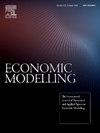Is monetary policy transmission green?
IF 4.2
2区 经济学
Q1 ECONOMICS
引用次数: 0
Abstract
This paper examines whether traditional monetary policy affects firms differently based on their carbon emissions—a previously unexplored driver of monetary policy non-neutrality. We develop a theoretical model predicting that carbon-intensive (”brown”) firms are more sensitive to monetary policy shocks due to investor preferences for ”green” assets. We test this prediction using stock price data from U.S. firms between 2010 and 2019. Our findings confirm that brown firms are more sensitive to monetary policy shocks than green firms. This heightened sensitivity persists even after controlling for financial constraints and intensifies with rising climate awareness among investors. Our results suggest that traditional monetary policy is not carbon-neutral and unintentionally amplifies biases related to carbon emissions, highlighting important considerations for policymakers.
求助全文
约1分钟内获得全文
求助全文
来源期刊

Economic Modelling
ECONOMICS-
CiteScore
8.00
自引率
10.60%
发文量
295
期刊介绍:
Economic Modelling fills a major gap in the economics literature, providing a single source of both theoretical and applied papers on economic modelling. The journal prime objective is to provide an international review of the state-of-the-art in economic modelling. Economic Modelling publishes the complete versions of many large-scale models of industrially advanced economies which have been developed for policy analysis. Examples are the Bank of England Model and the US Federal Reserve Board Model which had hitherto been unpublished. As individual models are revised and updated, the journal publishes subsequent papers dealing with these revisions, so keeping its readers as up to date as possible.
 求助内容:
求助内容: 应助结果提醒方式:
应助结果提醒方式:


